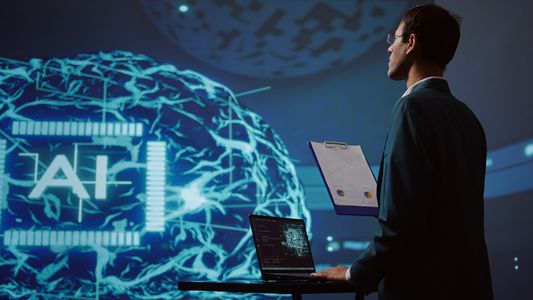The Democratization of AI: Empowering the World Through Accessible Innovation
 Rebecca Baig
28 May, 2025
11 mins read
18
Rebecca Baig
28 May, 2025
11 mins read
18

Artificial Intelligence (AI) has emerged as one of the most transformative technologies of the 21st century. Once confined to tech giants, academic institutions, and elite research labs, AI is now entering a new phaseâ€â€democratization. This shift is about more than just access. It's about enabling individuals, startups, educators, and communities to create, shape, and benefit from AI in ways that were previously unimaginable.
The democratization of AI is changing who gets to participate in technological innovation. It’s lowering the barrier to entry, decentralizing control, and making powerful AI tools and knowledge available to a broader audience. In this blog, we’ll explore what AI democratization means, how it is unfolding, why it matters, and what the future could look like when artificial intelligence is truly for everyone.
What Is the Democratization of AI?
At its core, the democratization of AI means making AI accessible, understandable, and usable by the general public. It involves:
- Access to tools like pre-built models and open-source libraries
- Education and training through online courses and communities
- Affordable infrastructure via cloud computing and AI-as-a-Service platforms
- Simplified development through low-code/no-code interfaces
This movement breaks down the walls of exclusivity and opens doors for individuals and organizations without deep technical expertise or massive financial resources to contribute to and benefit from AI development.
Why Democratizing AI Matters
1. Wider Innovation Potential
When more people can build with AI, the result is a greater diversity of ideas and applications. From healthcare solutions in remote areas to personalized education platforms and climate monitoring tools, democratized AI fuels grassroots innovation that addresses real-world needs.
2. Leveling the Playing Field
For decades, only large corporations with significant computing power and data could create and benefit from AI. Democratization levels the playing field, allowing small businesses and individuals to harness the same capabilities and remain competitive.
3. Inclusion and Representation
AI systems often reflect the biases of those who create them. Opening AI development to a broader, more diverse population ensures that different perspectives are included, leading to fairer, more representative systems.
4. Economic Growth
By making AI tools and skills accessible to a broader workforce, countries and communities can unlock new economic opportunities, foster entrepreneurship, and stimulate job creation across sectors.
Key Enablers of AI Democratization
ðŸâ€â€œ Open-Source Software
Libraries like TensorFlow, PyTorch, and Hugging Face have made it easier than ever to experiment with AI. These tools are free, well-documented, and supported by vibrant communities, making them invaluable for developers and hobbyists alike.
â˜Â︠Cloud-Based AI Platforms
Amazon Web Services, Microsoft Azure, and Google Cloud offer AI-as-a-Service platforms that provide infrastructure, pre-built models, and development environments at low cost. This eliminates the need for expensive hardware or deep technical knowledge.
🎨 No-Code/Low-Code Tools
Platforms such as RunwayML, Lobe, and DataRobot allow users to train models, create applications, and analyze data with drag-and-drop interfaces. Educators, designers, and business analysts can now integrate AI without writing code.
🧑â€ÂðŸÂ« Online Learning and Training
From YouTube tutorials to MOOCs (Massive Open Online Courses), there’s a wealth of resources available to learn AI at your own pace. Platforms like Coursera, Udemy, and edX make high-quality instruction available to anyone with an internet connection.
🌠Community and Collaboration
Online forums, hackathons, and collaborative projects (like Kaggle) are enabling a new generation of AI enthusiasts to share knowledge, solve problems together, and innovate collectively.
Real-World Examples of Democratized AI in Action
ðŸÂÂ¥ Healthcare in Low-Resource Areas
In many parts of the world, AI is helping bridge the gap in medical care. For example, mobile apps powered by machine learning help diagnose diseases, monitor symptoms, and provide early intervention guidance. These tools are often developed using open-source frameworks and accessible datasets.
🌱 Precision Farming
Farmers in emerging economies are using AI-driven applications to monitor soil health, predict weather, and manage resources more effectively. Many of these applications were created by small teams using low-cost AI tools and satellite data.
📚 Personalized Education
Teachers are customizing learning experiences using AI-based assessment tools. Students receive personalized feedback, while educators use insights to adjust teaching strategies. With platforms like Google's Teachable Machine, even educators with no programming background can build simple AI tools.
🛒 Small Business Growth
AI chatbots, inventory management systems, and customer behavior analysis tools are helping small business owners make smarter decisions. These tools, once exclusive to big brands, are now available via affordable subscription models.
Challenges to Overcome
Despite its promise, the democratization of AI is not without challenges.
⚠︠Digital Divide
Access to internet, devices, and electricity remains limited in some regions. Without basic infrastructure, participation in the AI economy is impossible.
⚠︠Skill and Knowledge Gaps
While tools are becoming easier to use, effective AI deployment still requires a basic understanding of data, algorithms, and ethics. Investment in education and training is essential.
⚠︠Ethical Concerns
As more people gain access to AI, the risk of misuse grows. Ethical frameworks and policies must evolve to guide responsible use and prevent harm.
⚠︠Data Privacy
The accessibility of AI tools increases the risk of misuse of personal data. It’s crucial to embed strong privacy standards and raise awareness about data protection.
The Role of Governments and Institutions
To support democratization, governments, NGOs, and educational institutions must:
- Promote digital literacy and fund public training programs
- Support open access to research and public datasets
- Create regulatory frameworks that encourage innovation while protecting public interests
- Facilitate partnerships between the public sector, academia, and the private sector
By creating inclusive policies and investing in AI literacy, institutions can help ensure that the benefits of AI reach all corners of society.
Looking Ahead: A Future Built by Everyone
The democratization of AI marks a cultural and technological turning point. We are transitioning from a world where AI was built for people by a few, to a world where AI is built with people by many.
Imagine a world where:
- A high school student uses AI to design a clean water solution for their village.
- A small-town doctor trains an AI tool to detect a rare disease.
- A local artist uses machine learning to create interactive digital experiences.
This future isn’t far offâ€â€it’s already happening. As tools become more powerful and accessible, more people will realize they don’t need to be data scientists or coders to be part of the AI revolution. They just need access, education, and support.
Conclusion
The democratization of AI is not a luxuryâ€â€it’s a necessity. If we want to ensure that the benefits of AI are widespread and equitable, we must continue to break down the barriers that have kept this technology in the hands of a few. Through open access, inclusive education, and responsible development, AI can become a force for good that benefits everyone.
As we move forward, it’s essential to foster an ecosystem where AI is not feared or misunderstoodâ€â€but embraced as a collaborative tool for solving problems, driving growth, and improving lives.
window.NREUM||(NREUM={});NREUM.info={"beacon":"bam.nr-data.net","licenseKey":"NRJS-3109bb2e2783f515265","applicationID":"558315209","transactionName":"blUHbEVQCxECBUVQWVcfMEpeHhARBhRCFlRVXwIXVEMAAxcDU1VZXh4VUEc=","queueTime":0,"applicationTime":137,"atts":"QhIEGg1KGB8=","errorBeacon":"bam.nr-data.net","agent":""}
Written By:
Rebecca Baig



Hotels at your convenience
Now choose your stay according to your preference. From finding a place for your dream destination or a mere weekend getaway to business accommodations or brief stay, we have got you covered. Explore hotels as per your mood.





